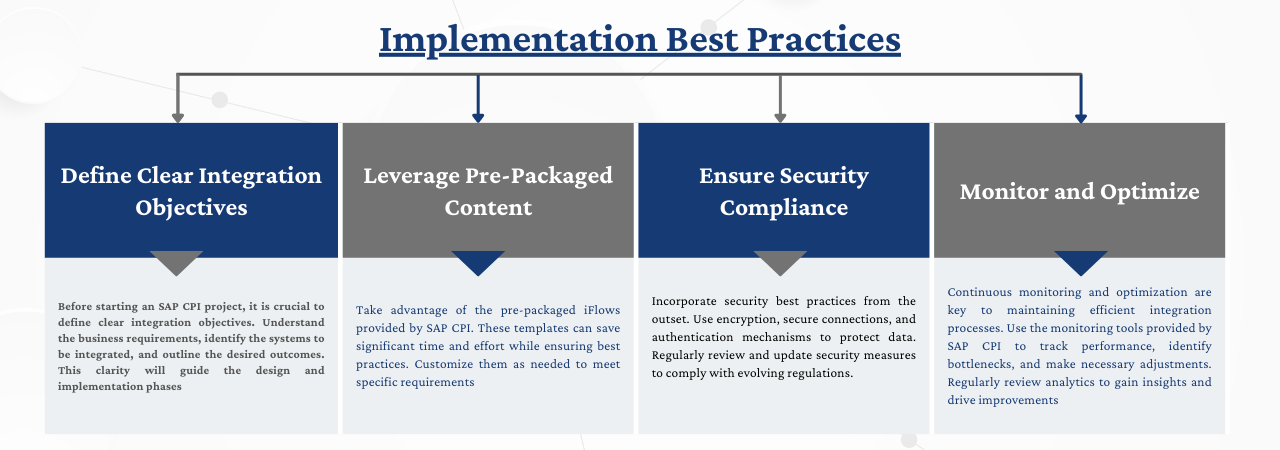SAP Cloud Platform Integration
SAP Cloud Platform Integration (CPI) is an Integration Platform as a Service (iPaaS) offering from SAP. It is designed to connect diverse applications and systems across complex IT landscapes. SAP CPI enables seamless data exchange and efficient process integration, facilitating the automation and optimization of business operations.
In today's fast-paced business environment, efficient integration and seamless data flow between various systems and applications are essential for organizational success. SAP Cloud Platform Integration (CPI) offers a robust solution to streamline and optimize your company's integration processes.
Key Features of SAP CPI
1. Pre-Packaged Integration Content:
SAP CPI provides a wide range of pre-packaged integration flows, known as iFlows, which are pre-configured to meet common integration needs these iFlows reduce the time and effort required to set up integrations, allowing businesses to focus on customization and specific requirements.
2. Robust Security Measures:
Security is a critical aspect of any integration platform. SAP CPI ensures data protection through advanced security features such as encryption, secure connections (SSL/TLS), and compliance with international data protection regulations. Additionally, SAP CPI supports OAuth, SAML, and other authentication mechanisms to ensure secure access.
3. Scalability and Performance:
Built on a scalable cloud infrastructure, SAP CPI can handle varying workloads and growing data volumes. It ensures high performance and availability, making it suitable for enterprises of all sizes. The platform's elastic nature allows businesses to scale their integration capabilities as needed.
Core Components of SAP CPI
1. Integration Flow (iFlow):
iFlows are the core building blocks of SAP CPI. They define the logic and sequence of data exchange between different systems. iFlows can be customized using various adapters and connectors to meet specific integration requirements.
2. Adapters and Connectors:
SAP CPI supports a wide range of adapters and connectors for different applications, databases, protocols, and technologies. These adapters facilitate seamless connectivity and data exchange between heterogeneous systems. Some common adapters include HTTP, SOAP, OData, and FTP.
3. Message Transformation and Routing:
SAP CPI offers powerful tools for message transformation and routing. These tools enable the conversion of data formats, mapping of fields, and routing of messages based on predefined rules. This capability ensures that data is accurately and efficiently exchanged between systems.
4. Monitoring and Analytics:
Effective monitoring and analytics are essential for maintaining the health of integration processes. SAP CPI provides comprehensive monitoring tools that allow users to track message flows, identify issues, and analyze performance metrics. These insights help in proactive management and optimization of integrations.
Benefits of SAP CPI Integration
1. Enhanced Business Agility:
By enabling seamless integration of applications and systems, SAP CPI helps businesses respond quickly to changing market conditions and customer demands. It supports agile business processes and fosters innovation.
2. Cost Efficiency:
SAP CPI eliminates the need for on-premises integration infrastructure, reducing capital expenditure and operational costs. Its pay-as-you-go pricing model ensures that businesses only pay for the resources they use, optimizing cost efficiency.
3. Streamlined Operations:
With SAP CPI, businesses can automate and streamline their operations. This leads to improved efficiency, reduced manual intervention, and minimized errors. As a result, organizations can focus on strategic initiatives rather than routine integration tasks.
4. Improved Data Quality and Consistency:
SAP CPI ensures accurate and consistent data exchange between systems. Its robust transformation and validation capabilities prevent data discrepancies, leading to better decision-making and operational efficiency.


